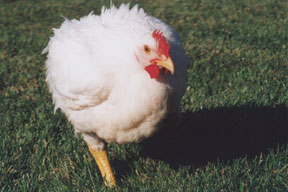February
2006
Move
Over Rover: The Urban Chicken Phenomenon
By Christine Morrissey
|
|
|
Emery. Photo courtesy of Christine Morrissey
|
Courtesy of Foster Farms, Emery was deemed to become
one of the many ‘all
natural’ chicken breast fillets found in the frozen food aisle
of a local Safeway. However, in a string of luck, this plump rooster
made an unusual detour from the normal life of a bird raised for meat.
One warm August night, rescuers with East Bay Animal Advocates discovered the
disabled four week-old broiler at a factory farm. Clucking the California Central
Valley goodbye, Emery relocated to the San Francisco Bay Area. This night changed
his life. Emery became an urban chicken.
The ‘poster chicken’ of the broiler industry, Emery has a crippling
case of splay-leg (a common limb deformity caused by nutritional deficiencies,
trauma or poor nesting surfaces). According to The Veterinary Record, 90 percent
of broiler meat chickens bred for rapid growth experience leg problems in addition
to heart and lung conditions. Factory farmed chickens suffering from splay-leg
often struggle to gain access to food and water and are denied veterinary care.
Welcome Home
Despite his leg condition, Emery (also known as ‘Bowling Ball’) could
stand on one leg perfectly and began adapting to his new living situation, a
small studio. Sleeping on blankets, gobbling down mash and spaghetti, and sunbathing
in the backyard, Emery found a new home.
Wait, a studio? A chicken living in an apartment? This may sound strange, but
a growing number of Americans are welcoming chickens into their homes and backyards
as companion animals.
From one-pound Bantams and mid-size Frizzle Cochins to ten-pound Giant Jerseys,
chickens are misunderstood as being oddly foolish, ‘bird-brained,’ and
just plain weird. However, rich with diversity and individuality, chickens really
are the cluck-of-the-town.
“People don’t realize that chickens are no different than other companion
animals. Chickens combine the best qualities of dogs and cats,” says Cheryl
Potter, founder of the Pet Poultry Group. “People assume they do not they
have intelligence or personality. They are very charming creatures. They will
win your hearts.”
Although the intelligence of chickens is often understated, studies have shown
that they can anticipate the future, grasp cause-and-effect relations, and maintain
self-control. “Chickens can be trained to do some pretty complicated things,” says
Dr. Laurie Siperstein-Cook of Davis, CA. “But intelligence should really
be measured by how adaptable an animal is to do well in his or her natural environment.
It has been shown that tiny three day-old chicks can recognize one individual
chick out of dozens from his or her group. To me, that’s an incredible
feat.”
Five years ago, Potter, a long-time vegetarian, acquired her first flock of chickens
when she moved to Santa Cruz. Today, she cares for 100 rescued birds, including
hens rescued from battery cage egg facilities.
“No matter what has happened to a chicken, they can be happy in the present.
A chicken really knows how to get over it,” says Potter. “They have
the ability to think that their future will not be the same as their past.” Adding, “They
are one of the most optimistic animals I have ever known.”
Chicken Care
Potter hosts a chicken meet-up group (http://chicken.meetup.com) that currently
has 50 members who meet regularly to discuss chicken care. Community groups in
Berkeley and Seattle also host backyard chicken care workshops.
Six years ago, Dr. Siperstein-Cook, a graduate of UC Davis School of Veterinary
Medicine, started an avian house call practice. Her clientele includes pet chickens,
ducks and parrots. “I have one client who has a rooster she rescued from
the street and raised. When she left the room for a minute, he stood there and
made little whining noises until she returned. Then he relaxed and followed her
around again,” she says. “Chickens can make good companions. Like
any domesticated animal, their relationship with people will depend first on
how they’re raised, then with how they’re kept,” she explains.
Chickens are also appreciated for their weeding and insect-hunting abilities
in gardens.
However, before adopting a chicken, caregivers should be mindful of local zoning
laws. Some municipalities limit or prohibit residents from having backyard chickens,
especially roosters (i.e. crowing concerns).
If a companion chicken lives indoors, however, caregivers must be diligent about
cleaning up after their feathered friends. Chickens are notoriously smelly poopers.
Oddly enough, chicken caregivers can now purchase diapers (www.chickendiapers.com)
for feathered friends who live indoors. Dr. Siperstein-Cook also notes that chickens
can be house-trained, but it’s a bit trickier than with a dog. And for
those who scoop their poop, chicken droppings are a great source for backyard
fertilizer.
Although chickens can happily live in urban apartments, like dogs, they should
be outdoors at least part of the day as they love to scratch in dirt, take dust
baths and lay in the sun. If chickens are left outdoors unsupervised, caregivers
need to provide protection from predators such as raccoons, coyotes, skunks,
bobcats and hawks. Caregivers should also be mindful to keep dogs and cats separated
from chickens.
At her suburban home in Davis, CA, Dr. Siperstein-Cook cares for seven chickens
from a variety of rescue situations. She concludes, “They live very exuberantly
in their new lives; it’s very gratifying to see.”
Christine Morrissey is Director of East Bay Animal Advocates. Learn more at www.eastbayanimaladvocates.org.
For more information about the plight of Foster Farms chickens, visit www.fosterfacts.net.

